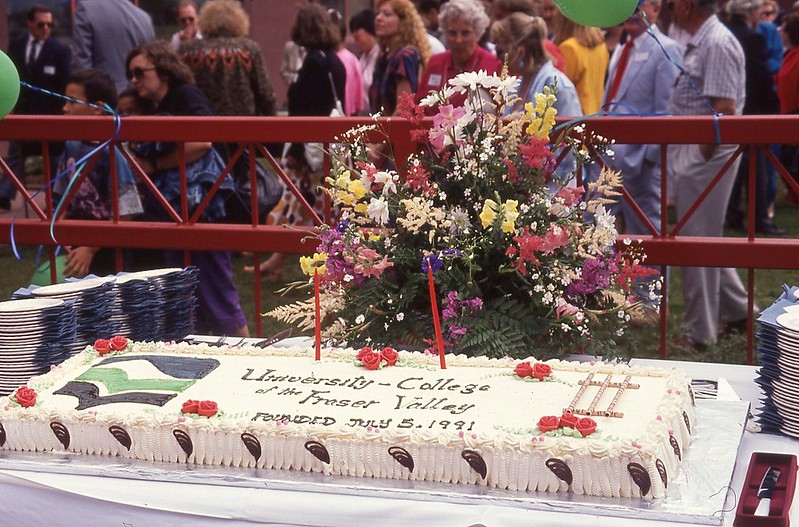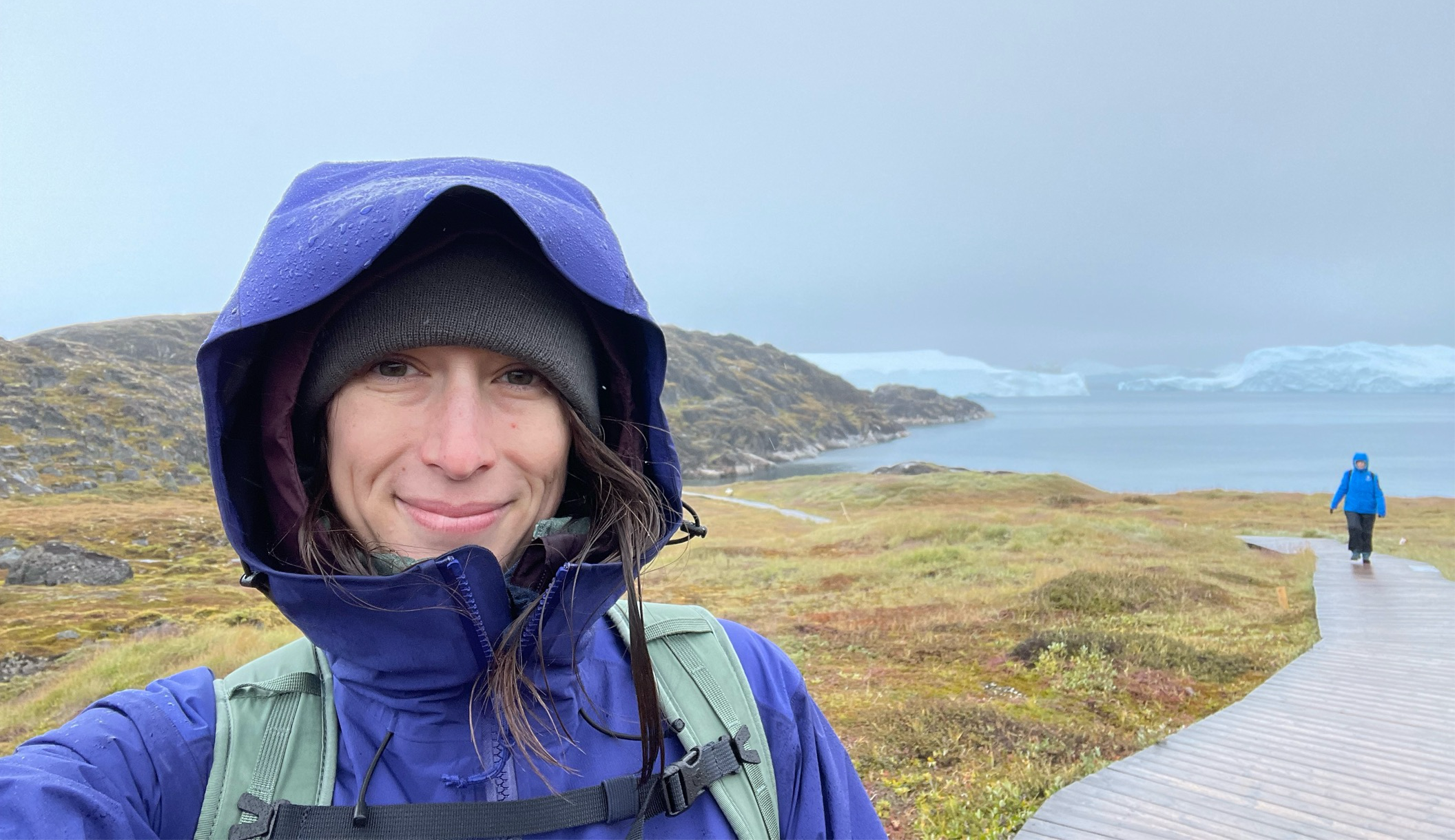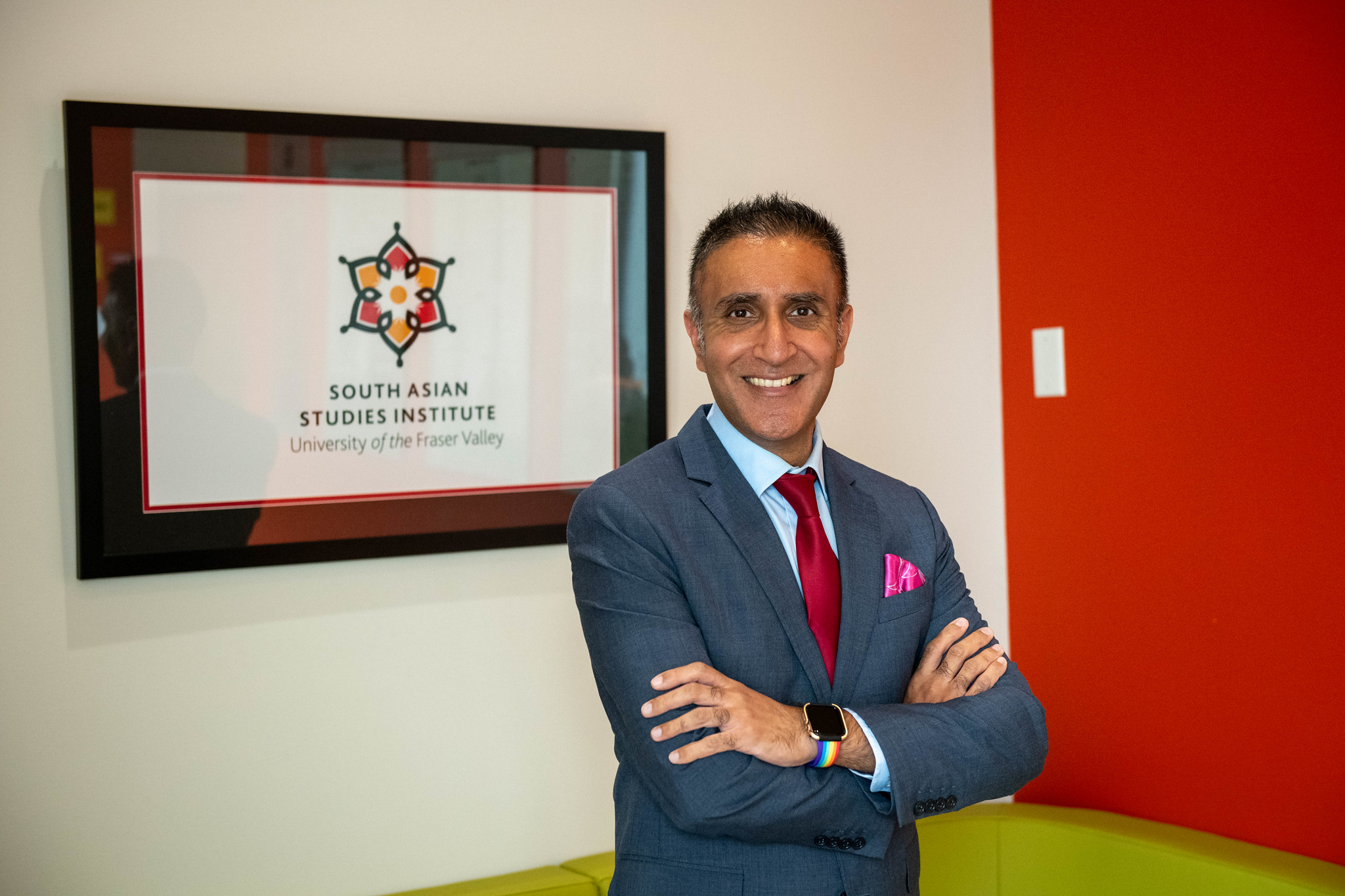Celebrating three decades of university degrees at UFV
As UFV celebrates its 50th anniversary in 2024, we look back at our roots and key moments in our evolution.
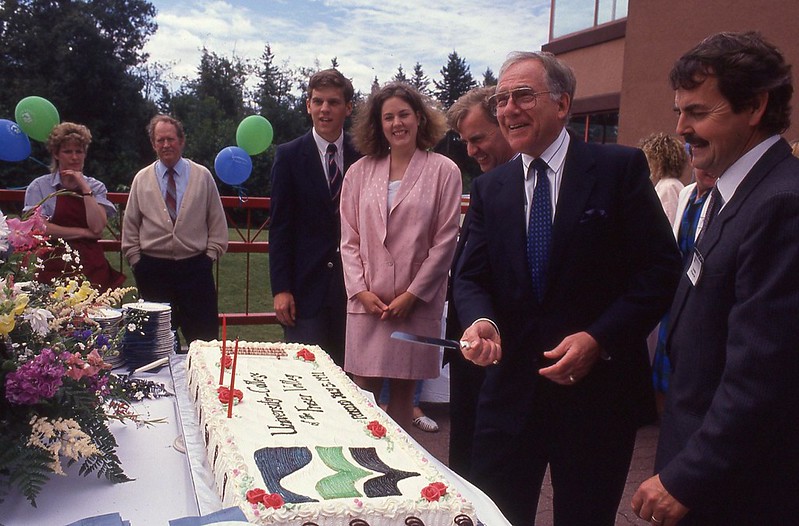
The year was 1991. Nirvana topped the music charts, Thelma and Louise, Beauty and the Beast, and Silence of the Lambs graced the silver screens, while grunge jeans, scrunchies, and Doc Martens walked the runways. And two single-mom students led the charge to transform a college into what would eventually become UFV.
July 5, 2021, marked a watershed moment for UFV. It was the 30-year anniversary of Fraser Valley College (FVC) becoming the University College of the Fraser Valley (UCFV), after a long and hard-fought community campaign.
This was one of the key turning points in UFV history. And 30 years ago this month, as 1991 shifted into 1992, UFV faculty, staff, and administrators were busy planning to launch its first three bachelor’s degree programs, in partnership with established universities.
There would be no UFV without the UCFV phase. It served as a transition from a two-year college to a full-fledged university. It’s possible to think of UFV’s journey from small community college to full-fledged regional university as a fait accompli or destiny, but the road to university status was filled with stumbling blocks and barriers.
The transition to university-college status allowed the institution to begin offering third- and fourth-year programming, at first granting other universities’ degrees, and then eventually its own.
British Columbia first began experimenting with the university-college concept in 1989, when the new status was conferred upon Okanagan, Cariboo, and Malaspina colleges.
In March 1988, Stan Hagen, the BC Minister of Advanced Education and Job Training, announced the ‘Access for All’ initiative, which would allow selected colleges to become university colleges, and in 1989 the government designated three community colleges as the first of this new breed of institution.
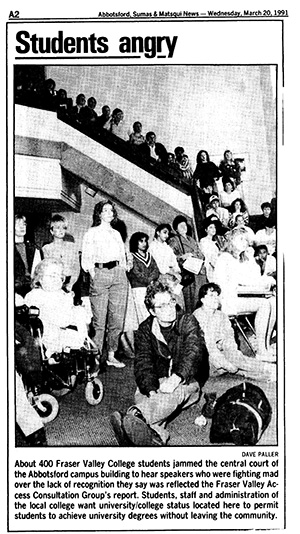 “Stan Hagen apparently went into a meeting having chosen Kamloops, Kelowna, and Prince George as the location of the new university colleges,” relates former FVC/UCFV president Peter Jones. “But Bruce Strachan, the MLA for Prince George, said no way, and that he would settle for nothing but a real university. So that’s where the University of Northern BC came from. The premier then asked Stan what community he would choose instead of Prince George, and he chose Nanaimo. That’s how Okanagan, Cariboo, and Malaspina became the first university colleges. Fraser Valley College was thought to be too close to the city.”
“Stan Hagen apparently went into a meeting having chosen Kamloops, Kelowna, and Prince George as the location of the new university colleges,” relates former FVC/UCFV president Peter Jones. “But Bruce Strachan, the MLA for Prince George, said no way, and that he would settle for nothing but a real university. So that’s where the University of Northern BC came from. The premier then asked Stan what community he would choose instead of Prince George, and he chose Nanaimo. That’s how Okanagan, Cariboo, and Malaspina became the first university colleges. Fraser Valley College was thought to be too close to the city.”
Still, there was a general recognition as the ’80s turned to the ’90s that something had to be done to increase access to education in the Fraser Valley. The Social Credit government commissioned former MLA Harvey Schroeder to conduct a formal consultation into access to post-secondary education in the area. He travelled the area, attending community forums and meeting with interested parties in the fall of 1990.
FVC saw an opportunity to push for the university-college status it had missed out on in 1989. Meetings were held, brochures published, briefs produced. The public attendance at meetings was solid and community support was good. Enthusiasm was high for moving to the next level in the Fraser Valley.
Then Schroeder’s report came out.
It recommended that a new free-standing university be built and become operational somewhere in the Fraser Valley by 1995, and that Simon Fraser offer an extension program of upper-level courses in the Fraser Valley, perhaps by using Kwantlen and Fraser Valley College classrooms. It did not endorse the university-college model for which many Fraser Valley residents had vociferously lobbied. FVC would not be able to grant degrees.
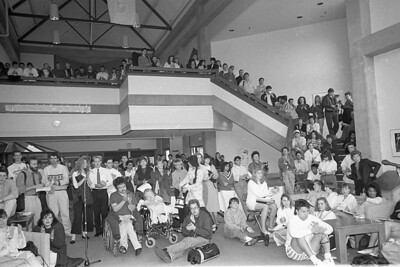
Students, faculty, administrators, staff, and community members were all dismayed that FVC’s proposal to become UCFV was being overlooked and seemingly dismissed.
Sue Gadsby and Jaclyn Rea were two FVC students at the time, roommates and single mothers sharing a townhouse in Chilliwack while attending classes and raising their young sons. They had pinned their hopes on university-college status for FVC, knowing that it was the only way they and other students in their situation could afford to pursue a degree. They also loved FVC and its instructors and desperately wanted to continue their studies here.
“We’d been feeling pretty good about the prospect of getting UC status when the Schroeder commission was conducting meetings,” recalls Sue. “A lot of the community felt the way we did, that it was a ‘done deal’ that we’d get the status because community support was so strong.
“When the report came out without a strong endorsement of the concept, suddenly it was in jeopardy and seemed like it likely wouldn’t happen. We just decided that we weren’t going to take no for an answer. We wanted to ensure that the community was heard because it seemed that Schroeder hadn’t heard us the first time. So we created a community coalition to make it clear that Fraser Valley community members had a strong opinion about this. We wanted to show that it wasn’t just employees or even just students.”
“When we heard that the Fraser Valley wouldn’t be getting a university college, that really sparked the community,” recalls Bob Warick, who was director of community relations at FVC. “We knew that we couldn’t run a campaign entirely out of the college — the support had to come from the community. And the support was there. Individuals and businesses stepped up to buy ads to publicly support the cause.”
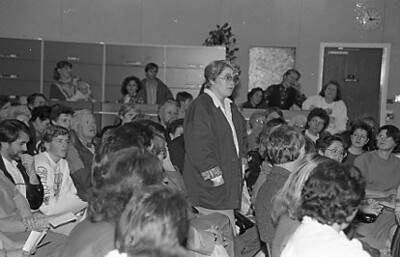
Fraser Valley communities were used to having to apply pressure on the government to get what they wanted when it came to higher education. It had taken over a decade and various false starts for the college itself to be legislated into existence in 1974.
The Fraser Valley rallied once again, thanks in no small measure to the Community Coalition to Support the University College Concept, run by Sue and Jaclyn out of their shared townhouse in Chilliwack.
Others were involved too. The late Pat McQueen was an eloquent FVC student from Abbotsford who was always willing to speak on the cause’s behalf. The FVC Student Society, at that time chaired by future Hope mayor Wilf Vicktor, helped organize large student rallies in Abbotsford and Chilliwack. And the FVC administration and the Faculty and Staff Association were strong and vocal proponents of the concept.
FVC’s Access committee (chaired by history instructor Jack Gaston), which had been tasked with finding a made-at-FVC solution to the access to education question and which had championed the university-college concept, met weekly to strategize.
FVC president Peter Jones and FVC board chair and noted horticulturalist Brian Minter were in constant contact with Victoria, letting the powers-that-be know that this issue wasn’t going to go away.
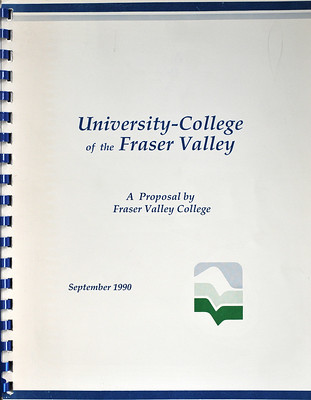
“Brian and I went to Victoria on several occasions to talk to Ministry of Advanced Education representatives and anyone else who would listen,” recalls Peter Jones. “Brian always brought flowers for the secretaries so that smoothed our way. Eventually, Advanced Education Minister Bruce Strachan, who was very focused on developing the new university in his own Prince George riding, summoned us to a meeting. He was fed up with all the politicking going on in the Fraser Valley about this. He told us that we would not be getting university-college status and that there was no point in going further with our lobbying.
“Well, Strachan hadn’t encountered a community leader like Brian Minter before. Brian drew himself up purposefully and said in a polite but forceful way: ‘We will not be giving up on our quest. You’ll be hearing more from us.’ And he was right. The communities of the Fraser Valley refused to back down.”
Letters were written and petitions were signed. The community coalition made presentations to city councils and civic organizations and did guest spots on local radio and were interviewed by print media. Community rallies were organized. As had been the case when lobbying for a community college was going on years earlier, community meetings were held in Chilliwack and Abbotsford.
“We got amazing attendance in Chilliwack,” Sue Gadsby recalls. “One man got up at that forum and said ‘when our kids go away to university they don’t come back’, and he made a passionate plea for making it possible for them to complete their degrees here.”
“The community really came through beautifully for us,” Peter Jones concurs.
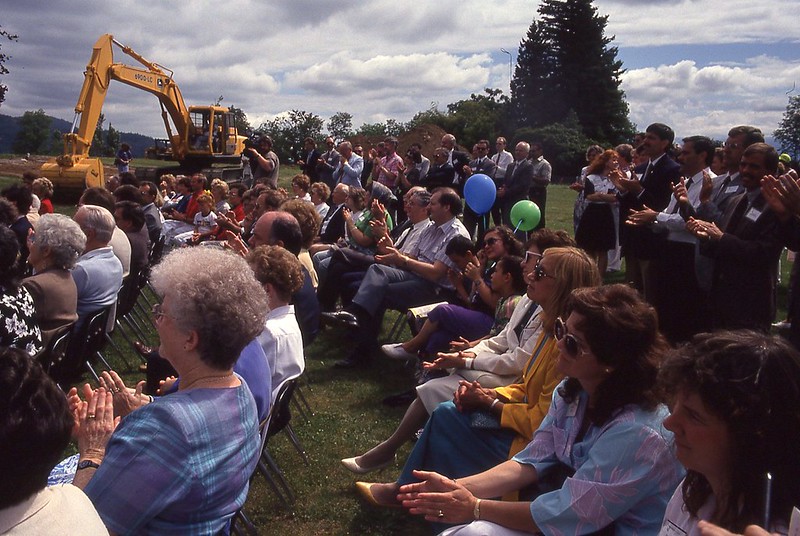
The two women leading the coalition led a frenzied life, balancing parenting duties, studies, and this impromptu community campaign. It was the days before email, Facebook, and the internet, so there were a lot of phone calls and letters and face-to-face meetings.
“We certainly racked up some huge phone bills,” Sue Gadsby remembers. “And the aviation students were prepared to fly us to Victoria for a meeting but that didn’t end up happening.”
It was an interesting time politically. The Social Credit party was coming to the end of a long reign. Premier Bill Vander Zalm had resigned amidst scandal and Rita Johnston, an MLA from Surrey, was now the premier. Local MLAs knew that their party’s chances of winning the next election were slim, so they were eager to get what they could for their communities while they still held the balance of power.
“This whole crazy campaign was going on during the dying days of the Social Credit government, but we were too deeply immersed in it to have much perspective on what that meant for our chances,” Sue Gadsby says. “It looked pretty bleak for a while. We heard that we’d been called naïve for even pursuing it by our own political science instructor, but we proved him wrong.”
The key to success was securing the support of the region’s MLAs.
“We knew we needed to convince them that this was vitally necessary for the region,” recalls Peter Jones. “We brought in the former president of the University of Victoria, Howard Petch, who was quite a fan of the university-college concept. After Chilliwack MLA John Jansen met with him, he agreed to throw his weight behind the idea.”
There were several cabinet shuffles in the last months of the Social Credit government, and the stars seemed to finally align for Fraser Valley College’s ambitions when Chilliwack MLA John Jansen was appointed Minister of Finance and Central Fraser Valley MLA Peter Dueck was named Advanced Education Minister.
Many interpreted this as a signal that things were finally going to happen for Fraser Valley College, and that was the case.
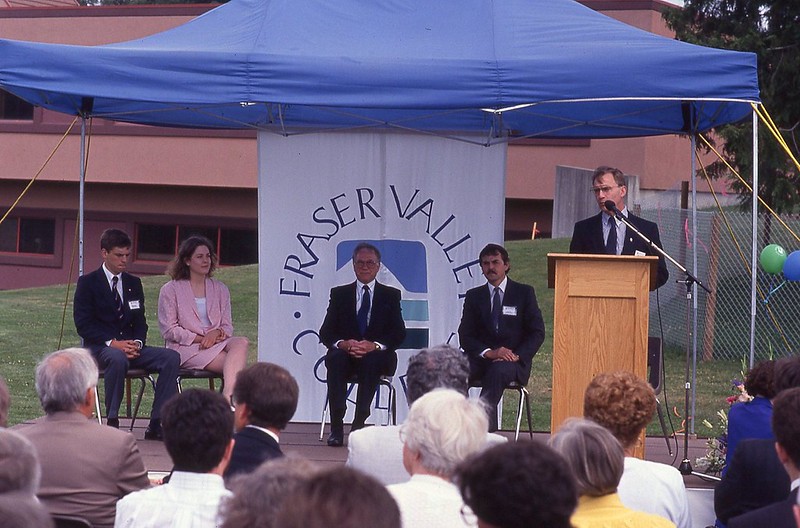 College officials were asked to prepare for a ceremony on July 5, 1991, on the Abbotsford campus. At that ceremony Peter Dueck announced university-college status for Fraser Valley College.
College officials were asked to prepare for a ceremony on July 5, 1991, on the Abbotsford campus. At that ceremony Peter Dueck announced university-college status for Fraser Valley College.
“We were so relieved,” recalls Sue Gadsby.
Although many people were involved in the campaign for university-college status, the two coalition leaders were recognized for kick-starting the campaign.
“I remember college board chair Brian Minter coming up to us with tears in his eyes, saying, ‘if it wasn’t for you two this would never have happened.’”
The front page of the Vancouver Sun the next day featured the two friends hugging and celebrating the victory.
Susan Gadsby has enjoyed a lengthy career with the Canadian Police College. She married UFV English professor Tim Haner, who was one of our first BA students, and one of their children is a student enrolled in the Bachelor of Arts degree program.
Dr. Jaclyn Rea went on to earn her PhD and is a lecturer at the University of British Columbia.
Wilfried Vicktor served several terms as Mayor of Hope.
Pat McQueen passed away after battling cancer.
John Jansen remained a strong supporter of UFV in his post-politics life, and received an honorary degree in 2019.
Brian Minter went on to be UFV’s first Chancellor in 2008. You can still find him in the aisles at Minter Country Garden and on the airwaves giving gardening advice. He received an honorary degree from UCFV in 2001.
The UCFV Legacy
Once Fraser Valley College received university-college status and became UFV, planning began in earnest for third- and fourth-year programming and bachelor’s degrees in several disciplines.
The first degrees were offered in partnership with other BC universities for several years before UCFV was permitted to offer them independently.
Arts, Business Administration, and Criminal Justice degrees launched in 1992.
Degrees in Science, Computer Information Systems, Child and Youth Care, Adult Education, Social Work, Nursing, and Kinesiology followed within the next few years.
The addition of third- and fourth-year programming led to one of the biggest hiring sprees in UFV history in the two to three years after the 1991 announcement. Hiring continued at a rapid pace through at least 1996.
Current and recently retired faculty and staff who joined UFV in that era of rapid growth and degree program development include Tom Baumann (retired 2021), Tim Cooper (retired 2021), Eric Davis, Tim Herron, Greg Schlitt (retired 2021), Robin Anderson (retired 2022), Cheri Enns, Kevin Dunn, Anne Russell, Leslie Olsen (retired 2022), Kasey Merritt, Maple Melder Crozier (retired 2022), Doug Rasmussen, Terry Starr, Heidi Cain, Martha Dow, Wendy Gracey, Aileen Ablog, Leah Carr, Zoe Dennison, Shawna Dyck, Norm Taylor (retired 2021), Jane Webb, Joseph Yu, Paul Gumprich (retired 2021), Regina Yorga, David Chu, David Harper, Bruce Kirkley (retired 2022), Peter Mulhern, Sylvie Murray, Noham Weinberg (retired 2022), Ron Dart, Carole Konkle, Tami White, Elizabeth Hughes, Eddie Campbell, Julie Jabbal (retired 2021), Stephen Piper, Christine Elsey (retired 2021), Katherine Watson (retired 2021), Grace Tsurumuru, Deborah Block (retired 2022), Isabel Hay, Greg St. Hilaire, Patti Wilson (retired 2022), Rhonda Styles, Cyrus Chaichian, Gayle Ramsden (died 2022), Anthony Stea, Alyson Seale, Daphne Cockerill, Gloria Borrows(retired 2022), Colleen Heron (retired 2021), Bryan Daniel, Mark Ryan, Randy Kelley, Gordon Jang, and Maria Bos Chan (retired 2021).


